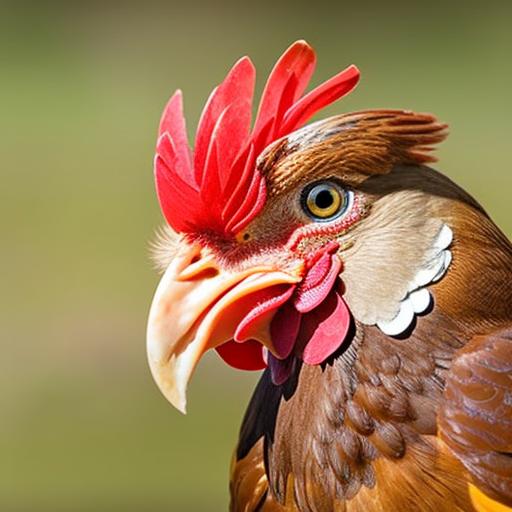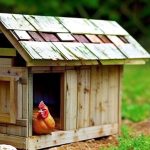Maintaining a chicken coop is essential for the health and well-being of your flock. A well-maintained coop not only provides a safe and comfortable environment for your chickens, but it also helps to prevent the spread of diseases and parasites. Regular maintenance can also save you time and money in the long run by preventing costly repairs or replacements. By taking the time to properly care for your chicken coop, you are ensuring that your chickens are happy and healthy, and that you are providing them with the best possible living conditions.
Importance of Keeping Chickens Happy and Healthy
Raising happy and healthy chickens has numerous benefits. Happy chickens are more productive, laying more eggs and producing higher quality meat. They are also less likely to exhibit aggressive or destructive behaviors, reducing the risk of injury to themselves or other flock members. Additionally, happy chickens are more resistant to diseases and parasites, as a strong immune system is essential for their overall health.
A well-maintained coop plays a crucial role in keeping chickens happy and healthy. A clean and dry coop helps to prevent the growth of bacteria and fungi that can cause respiratory issues or infections in chickens. It also reduces the risk of infestations by pests such as mites or lice. A properly ventilated coop ensures that chickens have access to fresh air, reducing the risk of respiratory problems. Additionally, a well-insulated coop helps to regulate temperature and humidity levels, creating a comfortable environment for your flock.
Choosing the Right Coop for Your Hens
When selecting a coop for your hens, it is important to consider your specific needs and requirements. There are several factors to consider, such as the size of your flock, the available space in your backyard, and your budget.
There are different types of coops available, including traditional wooden coops, mobile coops, and modular coops. Traditional wooden coops are sturdy and provide good insulation, but they require regular maintenance to prevent rotting or warping. Mobile coops, also known as chicken tractors, allow you to move your chickens to fresh grazing areas, providing them with access to fresh grass and insects. Modular coops are customizable and can be expanded as your flock grows.
When choosing a coop, consider the size and layout of the nesting boxes, roosting bars, and ventilation openings. Ensure that there is enough space for your chickens to move around comfortably and that the coop is secure from predators.
Proper Feeding and Watering Techniques
Proper feeding and watering are essential for the health and well-being of your chickens. Chickens require a balanced diet that includes a combination of grains, protein, vitamins, and minerals. It is important to provide them with a high-quality commercial feed or a well-balanced homemade feed. Additionally, chickens should have access to fresh water at all times.
The amount of food and water required will depend on the size of your flock. It is important to monitor their consumption and adjust accordingly. Overfeeding can lead to obesity and health issues, while underfeeding can result in malnutrition and decreased egg production.
Tips for Cleaning and Sanitizing the Coop
Regular cleaning and sanitizing of the coop is crucial for preventing the spread of diseases and parasites. A dirty coop can harbor bacteria, fungi, and pests that can harm your chickens.
Start by removing all bedding material from the coop, including straw or wood shavings. Use a rake or shovel to remove any droppings or debris. Scrub the walls, floors, and nesting boxes with a mild detergent or disinfectant solution. Rinse thoroughly with clean water and allow the coop to dry completely before adding fresh bedding material.
It is also important to regularly clean and sanitize the waterers and feeders. Remove any leftover food or debris and wash them with hot soapy water. Rinse thoroughly and allow them to dry before refilling with fresh food and water.
Maintaining Optimal Temperature and Humidity Levels
Maintaining optimal temperature and humidity levels in the coop is essential for the health and comfort of your chickens. Chickens are sensitive to extreme temperatures and high humidity, which can lead to heat stress or respiratory issues.
During hot weather, provide shade and ensure proper ventilation in the coop. You can use fans or open windows to promote air circulation. On extremely hot days, you can also provide frozen treats or shallow pans of water for your chickens to cool down.
In cold weather, insulate the coop to retain heat. Use straw or wood shavings as bedding material to provide insulation. You can also use heat lamps or heated waterers to keep the coop warm.
Monitor temperature and humidity levels regularly using a thermometer and hygrometer. Adjust ventilation and insulation as needed to maintain optimal conditions.
Protecting Your Hens from Predators and Diseases
Predators and diseases pose a significant threat to the health and safety of your chickens. It is important to take measures to protect your flock from these threats.
Install secure fencing around the coop to prevent predators such as raccoons, foxes, or dogs from gaining access. Use hardware cloth with small openings to prevent smaller predators such as rats or snakes from entering.
Regularly inspect the coop for any signs of damage or weak spots that could allow predators to enter. Repair any holes or gaps immediately.
To prevent diseases, practice good biosecurity measures. Limit access to your flock by visitors or other animals that may carry diseases. Quarantine new birds before introducing them to the flock. Keep the coop clean and dry, as damp conditions can promote the growth of bacteria or fungi.
Providing Adequate Space and Nesting Boxes
Providing adequate space and nesting boxes is important for the comfort and well-being of your chickens. Overcrowding can lead to stress, aggression, and decreased egg production.
As a general rule, allow at least 4 square feet of space per chicken in the coop and 10 square feet per chicken in the outdoor run. This will ensure that they have enough room to move around comfortably.
Provide enough nesting boxes for your hens to lay their eggs. A good rule of thumb is to have one nesting box for every 3-4 hens. Ensure that the nesting boxes are clean, dry, and filled with clean bedding material.
Encouraging Exercise and Playtime
Exercise and play are important for the physical and mental well-being of your chickens. Encouraging them to exercise and play can help prevent boredom and reduce stress.
Provide a spacious outdoor run where your chickens can roam, scratch, and peck. Include perches or roosting bars at different heights to encourage them to jump and fly.
You can also provide toys or enrichment activities to keep your chickens entertained. Hang a cabbage or other vegetables from a string for them to peck at. Place a shallow pan of sand or dirt for them to dust bathe in.
Incorporating Enrichment Activities into Your Hens’ Daily Routine
Enrichment activities are important for keeping chickens mentally stimulated and engaged. They help prevent boredom and reduce stress, leading to happier and healthier chickens.
Incorporate a variety of activities into your chickens’ daily routine. Scatter food or treats in the coop or outdoor run for them to search for. Provide them with different types of perches or roosting bars to jump on or explore.
You can also introduce new objects or materials into the coop for them to investigate. Hang mirrors or shiny objects for them to peck at. Place branches or logs for them to perch on or scratch against.
The Benefits of Raising Happy Hens in Grand Island, NE.
Maintaining a chicken coop and raising happy and healthy chickens has numerous benefits for both the chickens and their owners in Grand Island, NE. By providing a clean and comfortable living environment, you are ensuring the health and well-being of your flock. Happy and healthy chickens are more productive, laying more eggs and producing higher quality meat. They are also less likely to exhibit aggressive or destructive behaviors, reducing the risk of injury to themselves or other flock members.
Taking the time to properly care for your chicken coop and provide enrichment activities for your chickens not only benefits the chickens but also provides a rewarding experience for their owners. Raising chickens can be a fulfilling hobby that allows you to connect with nature and enjoy the fresh eggs or meat that they provide. By following proper maintenance practices and providing a happy and healthy environment for your flock, you are ensuring that both you and your chickens can enjoy the many benefits of raising happy hens in Grand Island, NE.
Meet Walter, the feathered-friend fanatic of Florida! Nestled in the sunshine state, Walter struts through life with his feathered companions, clucking his way to happiness. With a coop that’s fancier than a five-star hotel, he’s the Don Juan of the chicken world. When he’s not teaching his hens to do the cha-cha, you’ll find him in a heated debate with his prized rooster, Sir Clucks-a-Lot. Walter’s poultry passion is no yolk; he’s the sunny-side-up guy you never knew you needed in your flock of friends!







